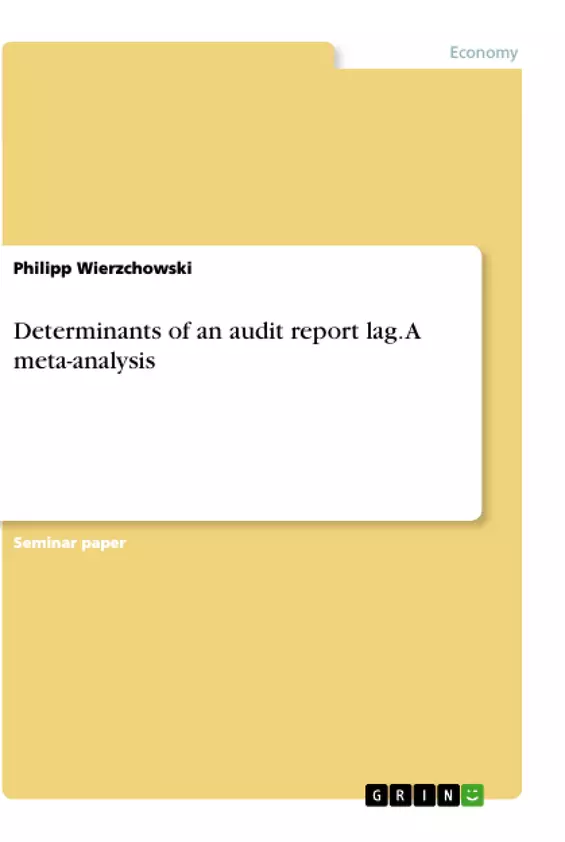This paper shows with the help of a meta-analysis the existence of the determinants of an audit report lag. Moreover this article calculates the relevance of these determinants with the help of Z-scores. The justification of this paper is to get a greater extent of knowledge through a meta-analytic literature review of the determinants of audit report lags. An audit report lag is the number of days from a company’s fiscal year-end to the date of its auditor’s report.
Due to the great development of the globalization and economy, this world has more economical data and is more complicated in an economical context than before. Proof for this statement is the subprime crisis 2007, where Asset-Backed Commercial Papers had a complicated transformation. In addition to this the accounting has issues with too much information and complicated financial products. At first accounting has problems with disclosure of information in the financial statement. Secondly Big Data challenges accounting and finally audit report lags are larger after a new standard is set by the standard-setter or a company has a poor performance in this particular fiscal year. In addition to this last problem, there are a lot of more determinants for an audit report lag than these two. Accordingly this audit report lag is a problem for accounting.
Inhaltsverzeichnis (Table of Contents)
- Introduction
- Problems and delimitations
- Objective and structure of the paper
- Rudiments
- Background
- Hypotheses development
- Audit commitment characteristics
- Unique-business complexity
- Meta-analysis
- Methodology of the meta-analysis
- Results
- Discussion and Conclusion
- References
Zielsetzung und Themenschwerpunkte (Objectives and Key Themes)
This paper examines the determinants of audit report lag using a meta-analysis. It aims to identify these determinants and assess their relevance, ultimately shedding light on the role of audit report lag in audit efficiency, corporate financial reporting, and audit client management.
- Determinants of audit report lag
- Relevance of determinants to audit report lag
- Impact of audit report lag on audit efficiency
- Impact of audit report lag on corporate financial reporting
- Impact of audit report lag on audit client management
Zusammenfassung der Kapitel (Chapter Summaries)
The introduction sets the stage for the study by outlining the problem of audit report lag and its impact on information asymmetry and investment decisions. The section on problems and delimitations further clarifies the scope of the research, emphasizing the focus on the determinants of audit report lag and excluding analysis of earnings announcements.
The objective and structure section lays out the paper's roadmap, highlighting its goal of examining the existing literature on audit report lag determinants, their relevance, and their impact on other key areas of accounting.
The rudiments section delves into the theoretical background of audit report lag, providing context within the broader framework of stewardship and decision usefulness approaches in accounting. The chapter explores the growing complexity and information overload in the accounting world, highlighting the need for reducing the time between a company's fiscal year-end and the release of the auditor's report.
The hypotheses development section presents key characteristics related to audit commitment and unique-business complexity as potential determinants of audit report lag.
Schlüsselwörter (Keywords)
This paper focuses on the determinants of audit report lag, their relevance, and the impact of audit report lag on audit efficiency, corporate financial reporting, and audit client management. Key terms and concepts include meta-analysis, audit report lag, information asymmetry, investment decisions, audit commitment, and unique-business complexity.
Frequently Asked Questions
What is an audit report lag?
It is the number of days from a company’s fiscal year-end to the date of the auditor’s report.
Why is the audit report lag significant for investors?
A shorter lag reduces information asymmetry and helps investors make more timely and informed decisions.
What are the main determinants of a longer audit lag?
Key determinants include business complexity, poor company performance, and the introduction of new accounting standards.
What methodology does this paper use?
The paper uses a meta-analysis of existing literature and calculates the relevance of determinants using Z-scores.
How does Globalization impact the audit process?
Globalization has made economic data more complicated and financial products more complex, challenging the efficiency of financial reporting and auditing.
- Citar trabajo
- Philipp Wierzchowski (Autor), 2020, Determinants of an audit report lag. A meta-analysis, Múnich, GRIN Verlag, https://www.grin.com/document/1135110



